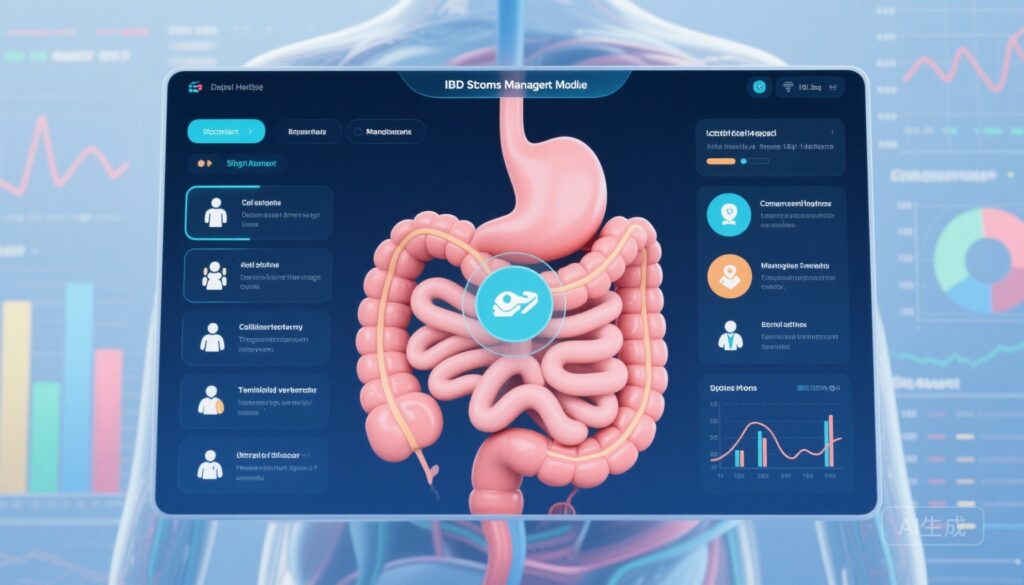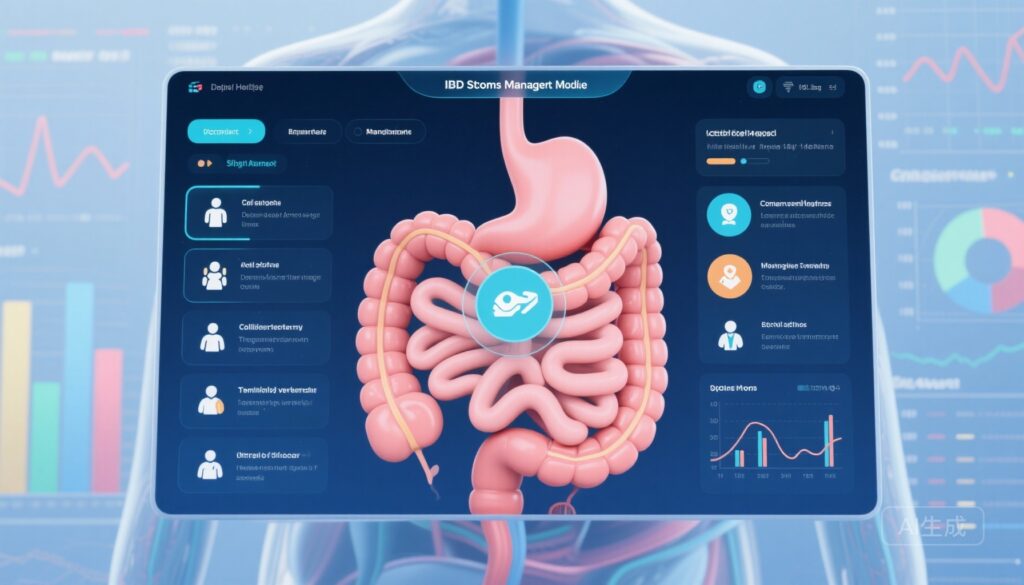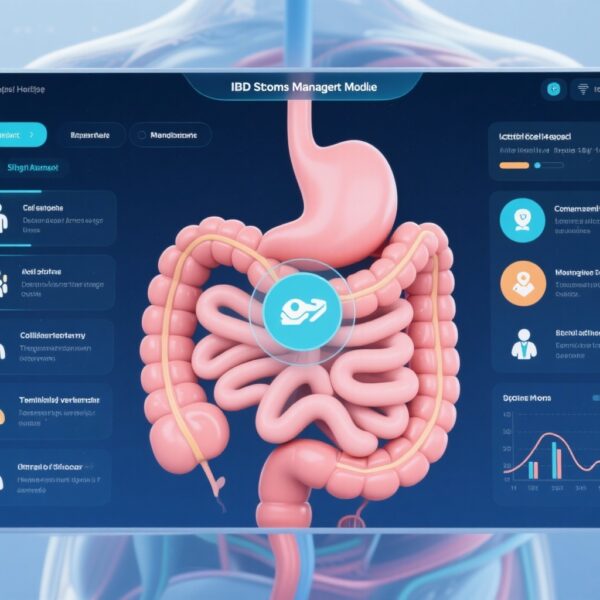Highlights
- IBD-BOOST is the first large-scale, multicentre randomized controlled trial of a digital cognitive behavioural self-management programme targeting fatigue, pain, and faecal incontinence in inflammatory bowel disease (IBD).
- The primary trial outcomes showed no statistically significant improvement in disease-specific quality of life (UK-IBDQ) or global symptom relief at 6 months compared with care as usual.
- Process evaluation highlights patient-perceived benefits in symptom understanding and management strategies, despite low adherence affecting quantitative outcomes.
- Future research priorities include enhancing intervention adherence and identifying patients most likely to benefit for targeted implementation.
Background
Inflammatory bowel disease (IBD), encompassing Crohn’s disease and ulcerative colitis, presents a chronic inflammatory condition with fluctuating activity. Beyond intestinal inflammation, patients frequently experience debilitating symptoms such as fatigue, chronic abdominal pain, and faecal urgency or incontinence—symptoms that significantly impair quality of life irrespective of disease activity status. Despite advances in medical therapies targeting inflammation, symptom burden related to these manifestations remains inadequately addressed.
Behavioral and psychological factors contribute to symptom perpetuation; thus, cognitive behavioural therapy (CBT) and self-management interventions offer a promising adjunctive approach. However, traditional face-to-face CBT is resource intensive and access-limited. Digitally delivered self-management programmes provide scalable options, offering flexibility and potential cost-effectiveness in chronic disease management.
The IBD-BOOST (IBD—Better Outcomes for Symptoms and Treatment) programme was developed to address this unmet need by providing a tailored, facilitator-supported, online cognitive behavioural self-management intervention to alleviate fatigue, pain, and faecal urgency/incontinence symptoms in people with IBD.
Key Content
Intervention Development and Theoretical Framework
The IBD-BOOST digital intervention was developed using the UK Medical Research Council (MRC) framework for complex interventions, incorporating a person-based approach. A transsymptomatic cognitive behavioural framework was constructed to target overlapping biological, cognitive, emotional, and behavioral perpetuating factors relevant across fatigue, pain, and urgency/incontinence symptoms.
The digital platform offers 12 web-based sessions, including 8 core and 4 symptom-specific modules. It features interactive content, visual aids, symptom tracking, email reminders, and tailored pathways according to predominant symptoms. Facilitator support comprises a 30-minute phone call after session 1 and ongoing on-site messaging, informed by nurse focus groups to optimize feasibility and user engagement.
Initial feasibility testing showed high acceptability, accessibility (mean score 9.43/10), ease of use (8.07/10), and clarity among patients, supporting advancement to a large-scale randomized controlled trial (RCT).
Randomised Controlled Trial Outcomes
Between January 2020 and July 2022, the IBD-BOOST RCT enrolled 780 participants aged 18 or older with IBD and moderate to severe symptoms (≥5/10 impact rating on fatigue, pain, or faecal urgency/incontinence). Participants were randomized 1:1 to the IBD-BOOST digital intervention or care as usual, with allocation concealment.
Primary outcomes assessed at 6 months post-randomization included:
– UK Inflammatory Bowel Disease Questionnaire (UK-IBDQ) for disease-specific quality of life (QoL)
– Global Rating of Symptom Relief (0-10 scale)
Results indicated:
– No statistically significant difference in UK-IBDQ scores between intervention and usual care (adjusted mean difference -1.67; 95% CI -4.13 to 0.80; p=0.19).
– No significant difference in Global Rating of Symptom Relief (adjusted mean difference 0.44; 95% CI -0.56 to 1.44; p=0.39).
However, complier-averaged causal effects (CACE) analysis suggested that participants adhering to the IBD-BOOST programme reported lower UK-IBDQ scores (worse QoL) than expected against their counterparts in usual care, potentially reflecting more severe baseline symptoms or a paradox needing further exploration.
The safety profile was similar between groups, with no treatment-related deaths and comparable adverse event rates.
Process Evaluation and Patient Perspectives
A linked mixed methods process evaluation employed qualitative interviews and platform usage analytics. Key findings included:
– High patient satisfaction with intervention content, structure, and perceived utility in enhancing symptom understanding and management.
– Many participants continued applying learned strategies beyond study completion.
– Preference for digital delivery based on flexibility and accessibility.
– Low objective adherence rates, which may have diluted the intervention effect in the RCT.
– Control group participants expressed disappointment with allocation but welcomed deferred intervention access.
These qualitative insights underscore the value patients placed on the programme despite neutral primary outcome results.
Comparative and Contextual Evidence
Prior to IBD-BOOST, there was a paucity of large-scale RCT data on digital behavioural self-management in IBD targeting multiple symptoms. For fatigue alone, smaller trials of CBT or mindfulness demonstrated modest benefits. IBD-BOOST’s multi-symptom, transdiagnostic approach is novel and theoretically justified, although real-world effectiveness depends on engagement.
Digital interventions in other chronic diseases highlight the challenge of adherence affecting outcome validity, with facilitator support commonly improving retention and effect size.
Expert Commentary
The IBD-BOOST trial’s neutral primary results despite positive process evaluation findings reflect a complex translational challenge between intervention design and clinical effectiveness. The importance of compliance is critical; low adherence likely attenuated measurable clinical benefit. RCTs in behavioral interventions frequently confront this issue, suggesting strategies to improve engagement (e.g., personalized prompts, adaptive facilitation) are necessary.
IBD symptoms like fatigue, pain, and faecal incontinence are multifaceted, with overlapping biological, neurological, and psychosocial determinants. Cognitive behavioural frameworks must be complemented by innovative approaches addressing internal and external barriers to digital intervention utilization.
Clinical guidelines increasingly recognize the role of psychological interventions in symptom management but emphasize tailored, multi-modal management plans. Digital self-management interventions like IBD-BOOST can enhance access but require integration with routine clinical pathways.
Future research should focus on:
– Identifying patient phenotypes most likely to benefit (e.g., high motivation, less severe baseline disease activity)
– Enhancing user engagement and adherence through technology and behavioral incentive design
– Longer-term outcomes and cost-effectiveness
– Integration of objective symptom metrics and biomarkers for personalized intervention adaptation
Conclusion
The IBD-BOOST digital cognitive behavioural self-management programme represents a rigorously developed, theory-driven intervention addressing significant symptom burdens in IBD. Although the primary RCT outcomes were neutral, patient-reported benefits and satisfaction support its clinical promise.
To realize meaningful clinical impact, future efforts must optimize adherence, target appropriate patients, and embed digital self-management tools into comprehensive care models. These steps are vital to leveraging digital therapeutics for improving quality of life in IBD beyond inflammatory control.
References
- Moss-Morris R, Norton C, Hart A, et al. Digital cognitive behavioural self-management programme for fatigue, pain, and faecal incontinence in inflammatory bowel disease (IBD-BOOST): a multicentre, parallel, randomised controlled trial. Lancet Digit Health. 2026 Sep 21;100906. doi: 10.1016/j.landig.2025.100906. PMID: 41206261.
- Hart AR, Norton C, Miller L, et al. Process evaluation findings contradict RCT results of the IBD-BOOST digital self-management intervention for fatigue, pain and faecal urgency in inflammatory bowel disease: A mixed methods study of patient perspectives. Br J Health Psychol. 2025 Nov;30(4):e70035. doi: 10.1111/bjhp.70035. PMID: 41236397.
- Cléirigh Büttner F, Hamborg T, Miller L, et al. A Novel Digital Self-management Intervention for Symptoms of Fatigue, Pain, and Urgency in Inflammatory Bowel Disease: Describing the Process of Development. JMIR Form Res. 2022 May 18;6(5):e33001. doi: 10.2196/33001. PMID: 35583924.
- Moss-Morris R, Norton C, Pollok R, et al. Supported online self-management versus care as usual for symptoms of fatigue, pain and urgency/incontinence in adults with inflammatory bowel disease (IBD-BOOST): study protocol for a randomised controlled trial. Trials. 2021 Aug 3;22(1):516. doi: 10.1186/s13063-021-05466-4. PMID: 34344432.




